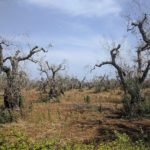 Xylella fastidiosa is a phytopathogenic bacterium that has been introduced in the European Union (EU), causing important yield losses in economically important Mediterranean crops. Almond leaf scorch (ALS) is currently one of the most relevant diseases observed in Spain, and no effective cure has been found for this disease.
Xylella fastidiosa is a phytopathogenic bacterium that has been introduced in the European Union (EU), causing important yield losses in economically important Mediterranean crops. Almond leaf scorch (ALS) is currently one of the most relevant diseases observed in Spain, and no effective cure has been found for this disease.
Many studies have been carried out on this disease, one of the most recent of which has been prepared by phytopathology experts Luis Moll, Aina Baró, Laura Montesinos, Esther Badosa, Ana Bonaterra and Emilio Montesinos entitled ‘Induction of defence responses and protection of almond plants against Xylella fastidiosa by means of endotherapy with a bifunctional peptide’.
The paper reports that, as in previous reports, the peptide BP178 has shown strong in vitro bactericidal activity against Xylella and other plant pathogens and to trigger defence responses in tomato plants. In the present work, BP178 was applied by endotherapy to almond cv. Avijor plants using preventive and curative strategies.
The ability of BP178 to reduce Xylella fastidiosa population levels and reduce disease symptoms, and its persistence over time, were demonstrated under greenhouse conditions. The most effective treatment consisted of a combination of preventive and curative applications and the peptide was detected in the stem up to 60 days after treatment.
BP178-primed plants induced defence responses mainly through the salicylic acid pathway, but also overexpressed some genes of the jasmonic acid and ethylene pathways.
It is concluded that the bifunctional peptide is a promising candidate to be further developed to control ALS caused by Xylella fastidiosa.
